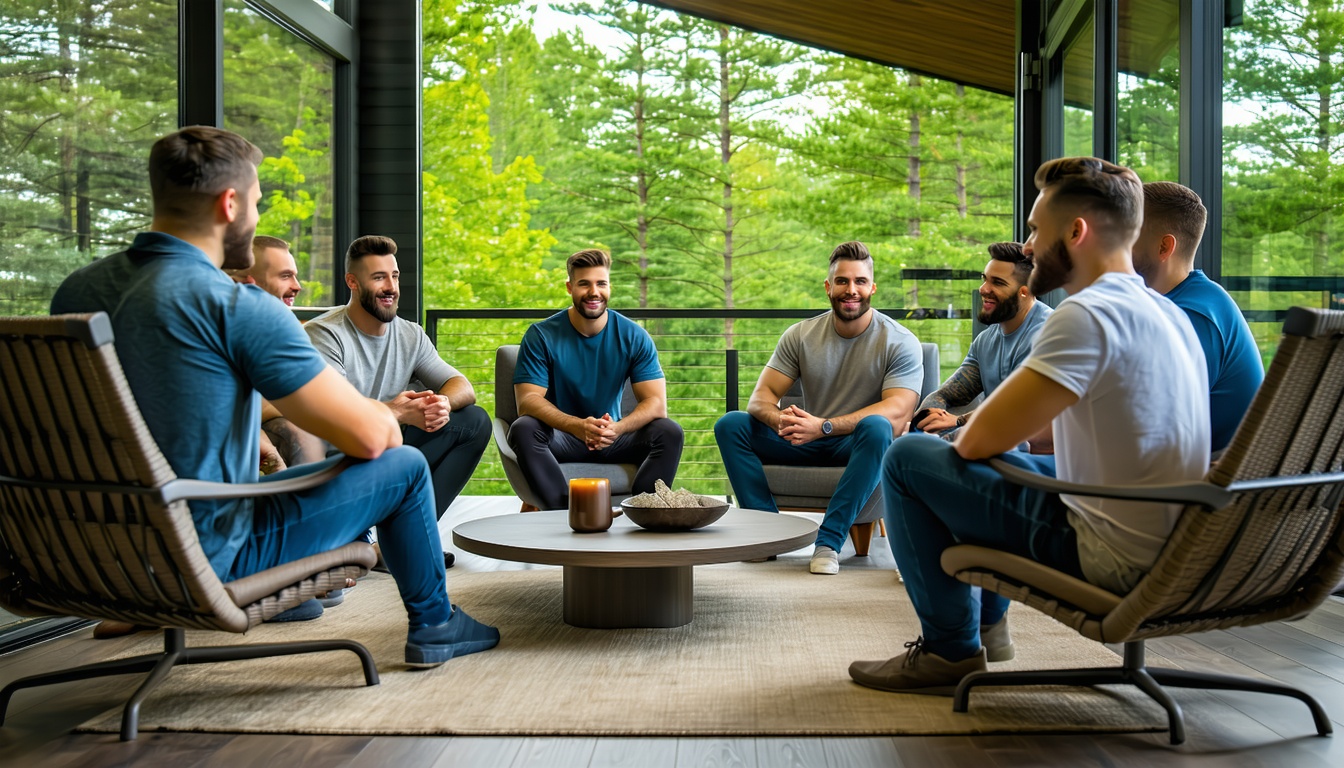Why Choose Recovery Bay Center
At Recovery Bay Center, we believe in providing the highest quality comprehensive drug and mental health care. Our approach combines medically assisted treatment with structured life skills training to ensure a holistic recovery experience.
Comprehensive Care Offered
Our center offers a range of services designed to cater to the individual needs of our clients. We understand that recovery is not a one-size-fits-all process, which is why we provide a variety of treatment options including inpatient drug rehab, inpatient alcohol rehab, and residential addiction treatment. Each program is structured to foster personal growth and resilience.
| Treatment Type | Features |
|---|---|
| Inpatient Drug Rehab | 24/7 medical supervision, integrated mental health care |
| Inpatient Alcohol Rehab | Personalized therapy, group support sessions |
| Residential Addiction Treatment | Structured environment, comprehensive aftercare planning |
We also cater to specific needs, offering specialized treatment programs such as opioid addiction treatment, fentanyl addiction treatment, and dual diagnosis treatment for individuals facing co-occurring mental health issues.
Specialized Medically Assisted Treatment
The medically assisted treatment we provide at Recovery Bay Center is tailored to help our clients manage withdrawal symptoms and reduce cravings, facilitating a smoother transition into recovery. Our staff is equipped with the expertise to utilize evidence-based approaches that align with the latest standards in addiction treatment, including medication assisted treatment options.
We recognize the importance of developing practical life skills during this process, as they play a crucial role in maintaining motivation and fostering independence. Our structured life skills training program focuses on essential competencies that empower individuals to handle daily responsibilities, make informed decisions, and ultimately contribute to personal growth. This approach helps build confidence and lays the groundwork for a fulfilling life beyond recovery.
Choosing Recovery Bay Center means opting for a comprehensive care experience that is dedicated to promoting health, wellness, and long-term recovery success. For more information on our holistic approach, visit our page on structured life skills training.
Structured Life Skills Training
Structured life skills training is a vital component of our recovery programs at Recovery Bay Center. It is designed to provide individuals with the essential tools necessary for long-term success in rehabilitation and daily life.
Importance of Life Skills in Recovery
Life skills are fundamental in the recovery journey, as they facilitate personal growth and provide a foundation for stability and self-sufficiency. Developing these skills empowers individuals to make informed choices and navigate the complexities of everyday life. Research has shown that effective life skills training can lead to significant improvements in various areas of an individual’s life, particularly in maintaining motivation during recovery and fostering independence.
Incorporating life skills education into treatment helps build resilience, which is critical for sustaining recovery. Skills in emotional regulation, decision-making, and problem-solving contribute to a stronger sense of self and improved mental health outcomes.
Practical Skills Taught
Our structured life skills training encompasses a range of practical skills that are essential for independent living. Below is a table summarizing some of these skills along with their benefits:
| Skill | Description | Benefits |
|---|---|---|
| Financial Responsibility | Learning budgeting, saving, and financial planning | Improved money management and reduced financial stress |
| Time Management | Techniques for prioritizing tasks and scheduling | Enhanced productivity and reduced overwhelm |
| Healthy Communication | Verbal and non-verbal communication techniques | Improved relationships and conflict resolution |
| Emotional Regulation | Strategies for managing emotions and coping mechanisms | Greater emotional stability and decreased anxiety |
| Problem Solving | Critical thinking and decision-making skills | Increased confidence in facing challenges |
Each of these skills not only contributes to personal development but also aligns with our core mission to offer comprehensive support during the recovery process. Our approach combines structured education with practical application, preparing individuals for real-world encounters beyond formal treatment.
For those interested in medically assisted treatment options, we offer various programs including inpatient drug rehab and dual diagnosis treatment, ensuring a holistic approach to recovery.
Life Skills Program Features
Our Structured Life Skills Training program at Recovery Bay Center is designed to equip individuals with essential skills necessary for successful recovery and independent living. This section highlights key features of our life skills training program.
Financial Responsibility Training
Understanding financial responsibility is critical for maintaining independence after recovery. Our program includes comprehensive training on budgeting, saving, and managing expenses. Participants will learn practical techniques to make informed financial decisions, which supports long-term stability. Key components of our financial responsibility training include:
| Skill | Description |
|---|---|
| Budgeting | Creating and maintaining a personal budget to manage income and expenses. |
| Saving | Setting financial goals and strategies for saving money effectively. |
| Understanding Expenses | Identifying fixed and variable expenses and planning accordingly. |
Learning these skills helps our participants gain confidence in managing their finances, ultimately reducing the risk of relapse due to financial stress.
Time Management and Organization Skills
Effective time management is vital for balancing various responsibilities. Our Structured Life Skills Training focuses on teaching techniques that promote organization and effective use of time. Participants will learn to prioritize tasks, set goals, and create schedules that support their recovery journey. Areas of focus include:
| Skill | Description |
|---|---|
| Prioritization | Techniques for prioritizing daily tasks and long-term goals. |
| Scheduling | Creating realistic schedules to manage time efficiently. |
| Organizational Tools | Utilizing planners and digital tools to keep track of commitments. |
These skills encourage structure in everyday life, making it easier to transition back into a routine.
Healthy Communication Techniques
Effective communication is essential for building and maintaining healthy relationships. Our program teaches participants strategies to express themselves clearly and assertively while also fostering active listening skills. Key elements of our healthy communication techniques include:
| Skill | Description |
|---|---|
| Assertiveness | Techniques to express needs and feelings appropriately. |
| Active Listening | Developing the ability to listen to others fully and respond thoughtfully. |
| Conflict Resolution | Strategies for resolving disagreements in a constructive manner. |
By enhancing their communication skills, participants can cultivate supportive relationships that are crucial for successful long-term recovery.
The structured life skills training we provide empowers individuals to develop the necessary skills to navigate life’s challenges effectively. For further details on our programs, feel free to explore additional offerings including dual diagnosis treatment and group program addiction.
Empowering Through Life Skills
At Recovery Bay Center, our focus on structured life skills training plays a vital role in our commitment to empowering individuals in their recovery journey. This training goes beyond mere instruction; it fosters independence and promotes self-sufficiency, crucial components for achieving lasting recovery.
Promoting Independence and Self-Sufficiency
Structured life skills training equips individuals with essential tools that enable them to live independently and responsibly. By learning practical, real-world skills, we help participants manage daily responsibilities and make informed decisions regarding their lives (The Wave of Clearwater). The emphasis on cultivating life skills nurtures self-sufficiency, providing our clients with the confidence necessary to navigate life’s challenges without relying solely on external support.
| Skill Area | Specific Skills Taught |
|---|---|
| Daily Living | Personal hygiene routines, meal preparation, household chores |
| Financial | Budgeting, saving, managing expenses |
| Social | Healthy communication techniques, conflict resolution |
As individuals master these skills, their self-esteem increases, leading to a greater sense of agency over their circumstances. This empowerment is foundational for those seeking to establish a fulfilling life post-treatment, enhancing their potential for long-term success.
Fostering Sense of Accomplishment
Engaging in structured life skills training instills a sense of accomplishment in participants as they successfully learn and apply these skills. This positive reinforcement contributes to personal growth and reinforces their commitment to recovery. The skills learned serve as building blocks, contributing to improved relationships and fostering accountability within themselves and their actions (The Wave of Clearwater).
Through collaborative activities and structured learning environments, individuals experience tangible success, which not only aids in skill acquisition but also strengthens motivation in their recovery journey. By fostering accomplishments, we help individuals see the progress they are making, reinforcing their dedication to a healthier lifestyle.
The lasting impact of life skills training at Recovery Bay Center extends far beyond treatment. It provides a solid foundation for independent living, empowers individuals with practical tools for success, and ultimately aids in preventing relapse. As our clients navigate their road to recovery, they find fulfillment in both their personal and social lives, greatly enhancing their overall well-being.
For more information on how structured life skills training is integrated into our recovery programs, visit our pages on residential addiction treatment or individual therapy addiction.
Long-Term Benefits of Life Skills
At Recovery Bay Center, we understand that structured life skills training plays a critical role in the recovery journey. It equips individuals with essential skills that promote not only recovery but also a fulfilling life post-treatment.
Maintaining Motivation in Recovery
Structured life skills training fosters a sense of accomplishment, which is vital for maintaining motivation during recovery. Engaging in hands-on activities, guided workshops, and real-life practice enables participants to apply their learned skills in practical settings (The Wave of Clearwater). This experiential learning helps bolster self-efficacy, empowering individuals to tackle challenges head-on while reinforcing their commitment to recovery.
| Motivation Factors | Description | Impact on Recovery |
|---|---|---|
| Sense of Accomplishment | Achieving small goals during training | Boosts confidence and keeps participants motivated |
| Empowerment | Learning to make responsible decisions | Increases agency in personal recovery journey |
| Practical Skills | Hands-on training related to daily life | Helps in managing responsibilities effectively |
This combination of empowerment, accomplishment, and practical learning contributes significantly to a person’s motivation to stay on the path of sobriety.
Foundation for Independent Living
Moreover, the skills learned through structured life skills training provide a strong foundation for independent living. It prepares individuals to handle daily responsibilities and make informed decisions, which are critical for successful reintegration into society (The Wave of Clearwater). By developing these practical skills, individuals are better equipped to improve their relationships, prevent relapse, and ultimately create a fulfilling life beyond mental health challenges.
| Areas of Skill Development | Benefits | Long-Term Impact |
|---|---|---|
| Financial Responsibility | Ability to manage finances effectively | Promotes stability and reduces stress |
| Time Management | Better organization of daily tasks | Increases productivity and lowers anxiety |
| Healthy Communication | Fosters improved relationships | Enhances personal and professional networks |
The lasting impact of this training extends beyond treatment—supporting ongoing personal growth and self-esteem, which is essential for long-term recovery success. By choosing Recovery Bay Center, you or a loved one will benefit from a program designed to build life skills that support a thriving, independent lifestyle.
Research Backed Effectiveness
Evidence from Botvin LifeSkills Training Program
At Recovery Bay Center, we emphasize the importance of structured life skills training as part of our comprehensive recovery approach. The Botvin LifeSkills Training (LST) program is a significant component of our methodology. Designed as an evidence-based substance abuse and violence prevention program, LST has been shown to reduce tobacco, alcohol, opioid, and illicit drug use by as much as 80% (LifeSkills Training). This extensive program has undergone rigorous testing, demonstrating its ability to produce lasting positive effects, with measurable outcomes apparent even after one year of implementation.
Multiple studies have confirmed the effectiveness of the LST program, revealing that students exposed to the training are significantly less likely to engage in high-risk behaviors. The program addresses critical areas that contribute to substance use, targeting skills that foster resilience and healthier decision-making (National Gang Center).
| Study Findings | Percentage Reduction |
|---|---|
| Tobacco Use | Up to 80% |
| Alcohol Use | Up to 80% |
| Illicit Drug Use | Up to 80% |
Impact on Substance Use Prevention
Research has shown that participants in the Botvin LifeSkills Training program report lower incidences of substance use across various measures. In a longitudinal study by Botvin et al., participants exhibited significantly lower rates of marijuana use immediately after the program, during a three-year follow-up, and continually at a 10-year follow-up (Blueprints Programs).
The training effectively targets and mitigates behaviors associated with a heightened risk of developing substance use disorders in the future. The results indicate that LST is effective for both males and females from diverse racial, ethnic, and demographic backgrounds, reinforcing the program’s broad applicability (Blueprints Programs).
In conclusion, structured life skills training, particularly through the Botvin LifeSkills Training program, demonstrates significant promise in fostering healthier lifestyles and preventing substance use, ultimately empowering individuals in their recovery journey. For more insights into how we implement life skills training, explore our approach at Recovery Bay Center through our various programs, including residential addiction treatment and dual diagnosis treatment.





